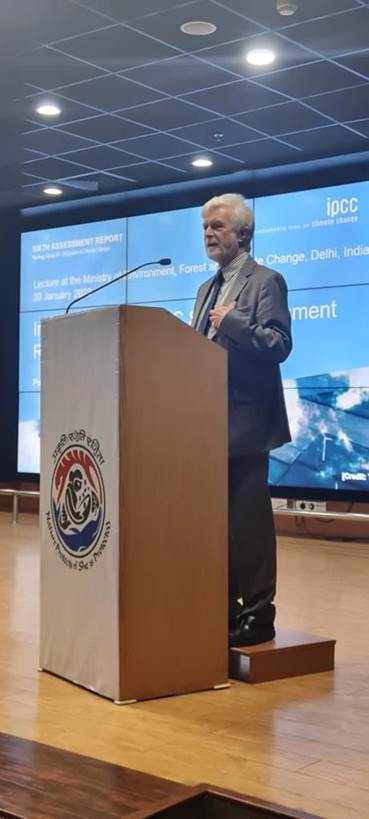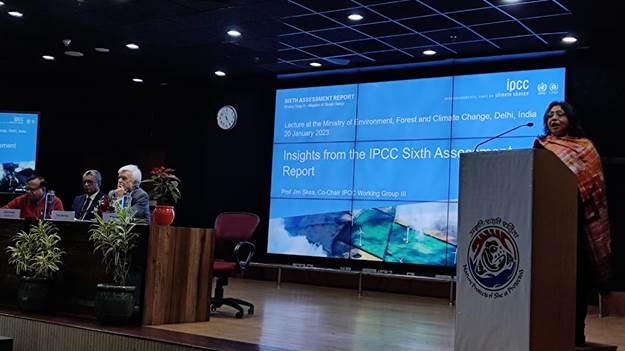Ministry of Environment, Forest and Climate Change
IPCC Working Group III Report highlights the importance of lifestyle in climate discourse
Sharm El-Sheikh Implementation Plan notes the importance of transition to sustainable lifestyles on the lines of Mission LiFE
WG III Report calls for minimizing adaptation gaps and need for higher investments in Southern Asia to address climate change
Posted On:
20 JAN 2023 9:00PM by PIB Delhi
Dr. Jim Skea, Professor at the Centre for Environment Policy, Imperial College London and currently the Co-chair of Working Group III (WG III) of the Intergovernmental Panel on Climate Change (IPCC) delivered a lecture today at Indira Pariyavaran Bhawan, New Delhi. The lecture focused on the IPCC Sixth Assessment Report (AR6) with a special emphasis on lifestyle issues. A short film on sustainable lifestyles was screened by the Ministry of Environment, Forest and Climate Change.

Dr Jim Skea delivering his address
As an outcome of COP27 at Egypt, the Sharm El-Sheikh Implementation Plan notes the importance of transition to sustainable lifestyles and sustainable patterns of consumption and production to address climate change. It also notes the importance of pursuing an approach to education that promotes a shift in lifestyles while fostering patterns of development and sustainability based on care, community and cooperation. This is in line with objectives of Mission LiFE launched by Prime Minister Shri Narendra Modi in the presence of UN Secretary General on 20th October, 2022.
Dr. Jim Skea spoke about the structure of IPCC and described how IPCC has produced three special reports and three Working Group reports during the sixth assessment cycle. He summarized the findings of the three Working Groups emphasizing the following findings from WG III:
-
- Lifestyle has been a neglected part of the climate discourse and its significant potential has now been identified in the WG III report.
-
- Global emissions could be reduced by 40%-70% by 2050 while satisfying people’s basic needs for nutrition, mobility and shelter while maintaining wellbeing. This could be achieved by demand-side management and lifestyles supported by infrastructure and technology.
-
- CO2 emissions account for about 75% of global GHG emissions making it the principal GHG to be tackled by climate change actions.
-
- Unequal contributions to historic and current emissions where the contribution of entire Southern Asia is only about 4% of historical cumulative net anthropogenic CO2 emissions between 1850 and 2019, even though the region includes almost 24% of the global population.
-
- Remaining budget for limiting warming to 1.5oC is 500 GtCO2; the remaining carbon budget for limiting warming to 2oC is 1350 GtCO2.
-
- Carbon Capture and Storage is at the demonstration stage. If brought into use, it would allow the use of fossil fuel to be extended. Unless managed sustainably, bio-energy combined with CCS could also have negative impacts on food security and biodiversity.
-
- How financial flows fall short of investment needs for mitigation. Gaps are particularly large for developing countries. Also, gaps are much wider for adaptation than for mitigation.
-
- Investment flows in Southern Asia and Africa are much lower than needed.
-
- Climate resilient development can protect people from the worse impacts of climate change and align climate change action with the sustainable development goals.
-
- There are increasing gaps between adaptation actions and what is needed, but there are options we can take to reduce the risks to people and nature. Adaptation gaps are largest among lower income populations.

The lecture was followed by discussion on historical cumulative emissions, the role of methane, financial mechanisms, sequestration potential of forests, data quality and needs, adaptation, Equity, climate justice, modelling assumptions, methods of preparing GHG inventories and the role of atmospheric observations.
In the above backdrop, it emerged that IPCC AR6 Synthesis Report, which is on anvil, should incorporate findings from three Working Group Reports in a balanced manner reflecting developing country concerns including historical cumulative emissions, declining carbon budget, adequacy of means of implementation and minimizing the adaptation gap.
***
MJPS/SSV
(Release ID: 1892594)
Visitor Counter : 1894
Read this release in:
Urdu